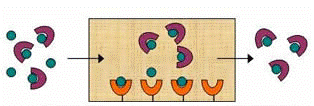Chemistry, Department of: Faculty Series

David Hage Publications
Document Type
Article
Date of this Version
2013
Citation
Published in Journal of Chromatography B, 2013: doi: 10.1016/j.jchromb.2013.11.043
Abstract
The study of metabolomics can provide valuable information about biochemical pathways and processes at the molecular level. There have been many reports that have examined the structure, identity and concentrations of metabolites in biological systems. However, the binding of metabolites with proteins is also of growing interest. This review examines past reports that have looked at the binding of various types of metabolites with proteins. An overview of the techniques that have been used to characterize and study metabolite–protein binding is first provided. This is followed by examples of studies that have investigated the binding of hormones, fatty acids, drugs or other xenobiotics, and their metabolites with transport proteins and receptors. These examples include reports that have considered the structure of the resulting solute–protein complexes, the nature of the binding sites, the strength of these interactions, the variations in these interactions with solute structure, and the kinetics of these reactions. The possible effects of metabolic diseases on these processes, including the impact of alterations in the structure and function of proteins, are also considered.


Comments
Copyright © 2013 Elsevier B.V. Used by permission.